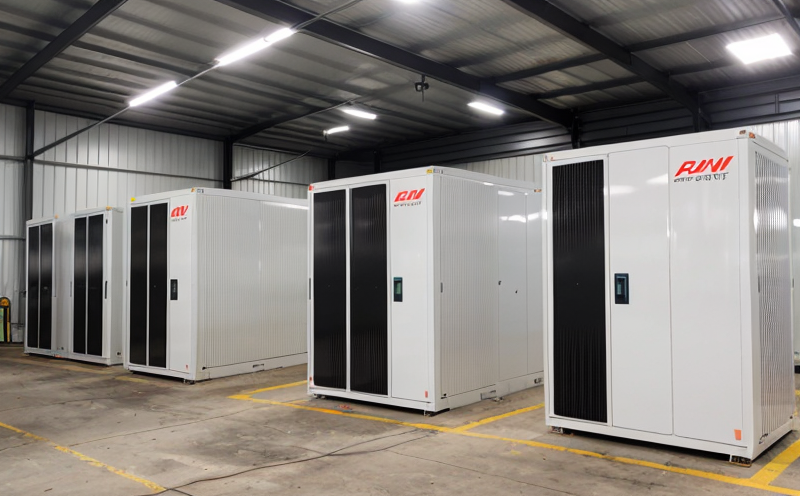ASTM D5721 Thermal Decomposition Testing of Battery Materials
The ASTM D5721 standard provides a method for determining the thermal decomposition temperature and rate of degradation of battery materials. This test is crucial in ensuring the safe operation and long-term performance of batteries, particularly those used in energy storage systems and electric vehicles.
Thermal stability testing plays an essential role in evaluating the safety and reliability of lithium-ion batteries, which are widely used across various sectors including automotive, renewable energy, and consumer electronics. The primary goal is to identify potential thermal risks that could lead to runaway reactions or fires. By conducting ASTM D5721 tests, manufacturers can ensure that their products meet stringent quality standards and regulatory requirements.
The test involves heating a sample at a constant rate until it reaches its decomposition point. During this process, the temperature, mass loss, and gaseous emissions are monitored to provide detailed insights into the material's thermal behavior. This information is invaluable for optimizing battery design, improving safety features, and enhancing overall performance.
ASTM D5721 testing helps in understanding how different materials behave under heat stress conditions. It also aids in identifying any weaknesses or vulnerabilities within the composition of these materials which might otherwise go unnoticed during initial development stages. Such knowledge is particularly important when dealing with advanced chemistries like solid-state electrolytes or silicon-based anodes that promise higher energy densities but come with unique challenges related to thermal management.
In summary, ASTM D5721 thermal decomposition testing offers critical data needed for the safe and efficient operation of batteries. It serves as a vital tool in the development lifecycle by providing insights into material stability, identifying potential hazards early on, and guiding necessary modifications towards safer designs.
Why It Matters
The importance of ASTM D5721 thermal decomposition testing cannot be overstated, especially given the rapid growth in demand for sustainable energy solutions. As more industries adopt electric vehicles and large-scale renewable energy projects, ensuring robust battery technology becomes increasingly critical.
- Safety: Accurate characterization of materials through ASTM D5721 helps prevent accidents caused by overheating or explosive reactions during charging or discharge processes.
- Performance Optimization: Understanding the thermal behavior allows for better management strategies, extending cycle life and improving overall efficiency.
- Regulatory Compliance: Meeting international standards like ASTM D5721 ensures compliance with local regulations and fosters trust among consumers.
In conclusion, this testing procedure is indispensable in maintaining high levels of safety, performance, and regulatory adherence within the energy sector. It supports continuous improvement efforts aimed at creating safer and more effective battery systems for tomorrow’s technologies.
Scope and Methodology
The ASTM D5721 standard specifies a procedure for determining the thermal decomposition temperature and rate of degradation using differential scanning calorimetry (DSC). This method involves heating a specified quantity of battery material at a controlled rate while measuring both heat flow and sample temperature. The key parameters measured include onset temperature, peak temperature, endothermic enthalpy change, and weight loss.
For accurate results, the test requires precise preparation of samples according to ASTM guidelines. Samples should be representative of typical production batches, free from contaminants, and homogeneously mixed if necessary. Proper sample handling is crucial as even slight variations can affect the outcome significantly.
The equipment used for conducting ASTM D5721 tests includes advanced differential scanning calorimeters capable of precise temperature control and accurate data acquisition. These instruments ensure reliable measurement of thermal properties over a wide range of conditions. Additionally, supporting software helps interpret raw data, providing valuable insights into material behavior under heat stress.
To summarize, the scope encompasses thorough preparation followed by meticulous execution on state-of-the-art equipment to achieve dependable results aligned with ASTM D5721 specifications.
Quality and Reliability Assurance
- Precision: Ensuring accurate temperature control is paramount; deviations can skew results, leading to incorrect conclusions about material stability.
- Data Integrity: Proper calibration of instruments guarantees consistent readings across multiple tests. Regular maintenance ensures longevity and accuracy of equipment.
- Certification: Compliance with international standards like ASTM D5721 not only assures quality but also enhances credibility in the marketplace.
In addition to technical aspects, maintaining robust quality assurance practices involves rigorous training programs for personnel involved directly or indirectly with ASTM D5721 testing. Continuous improvement initiatives ensure that methodologies remain up-to-date with evolving industry trends and technological advancements.





